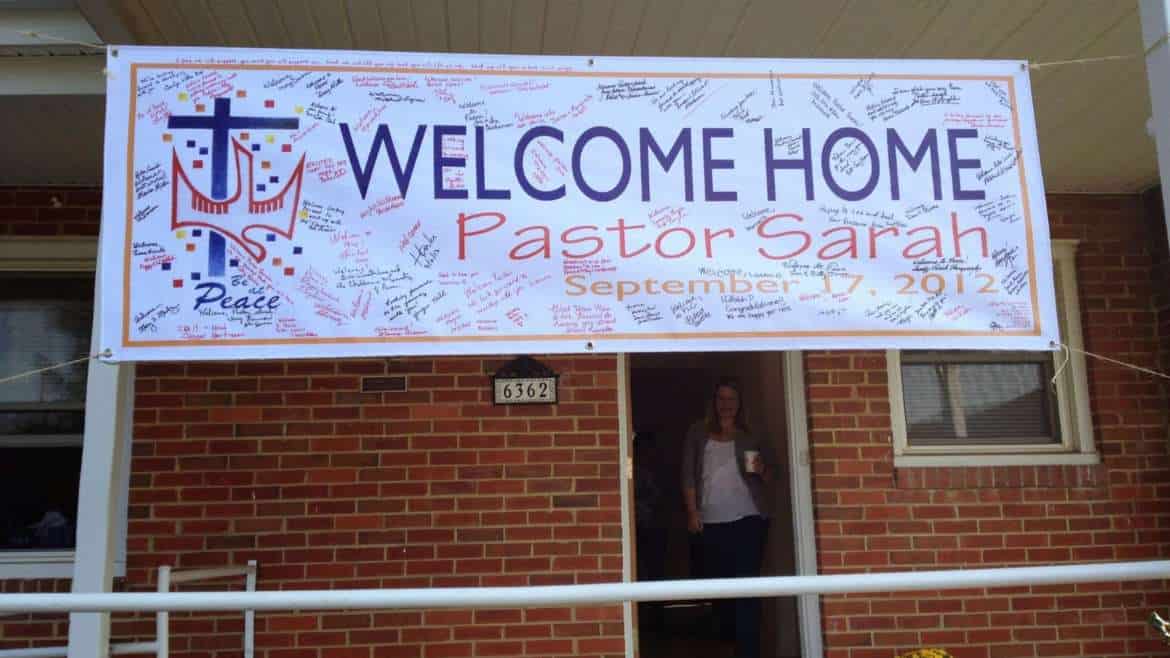Excerpts from Pastor Sarah’s Sermon on September 18, 2022, the ten-year anniversary of her call to Peace. Mark 9:30-37
—
First of all: Thank you.
That’s the way I started my sermon ten years ago, the first of over 400 I have given as your pastor.
I recounted the ways you had welcomed me that week: a welcome banner, invitations to homes, a prayer shawl and lots of chocolate. I thanked you and then I said “I hope the welcome hasn’t only been one way. I also am dedicated to welcoming you into my life, to learning your names and your gifts. Your history and your dreams. For we are in a time of mutual welcome.”
Little did I know just how much the theme of welcome would become a hallmark of Peace’s ministry over that decade. A year after I started, we crafted the six values that clarify our congregational identity. One of those values is about welcome:
We believe all people are loved and worthy of love; all are welcome in God’s Kingdom.
Welcome is a deceptively simple concept. It’s hard to welcome every person when life is already full. We have an incredible group of new members today. It is unrealistic that each of them will be equally welcomed by each existing member. That’s why the church has to develop other ways to ensure all are welcome here. Small groups and Bible Studies, mechanisms for people to be welcomed by the community, if not by each person. Wear a name tag! That’s an easy way to say “Welcome.”
You took Jesus invitation to welcome children not as a theoretically nice idea, but as a budgetary priority. You funded a nursery attendant for two years when we essentially had no children, knowing that we had to create the environment of welcome before the children would come. Then you funded a children, family and youth ministry. And look. They have come.
Sometimes welcoming all means being explicit about some, especially when the welcome hasn’t been there in the past, or when the welcome can’t be assumed. This is why we as a church are Reconciling in Christ. Because people of a variety of sexual and gender identities have too often not been welcomed in the church at large, we need to make it clear, you are welcome here. This is why we as a church work on racial justice. Because we know that the world – and the church – have not been welcoming to people of many races and ethnicities and in fact, has been quite the opposite. These are theological stances that come our understanding of God as creator of all. Welcome.
The very concept of welcome extends out into the ministry we do as a church for the world. It is impossible to sense that you are welcome in the world when you are also hungry or hurting. Peace’s social ministries – outreach and advocacy – are reflections of this ethos of welcome.
During the worst of COVID-19, our tech team formed and worship leaders spent untold energy making sure that all could be welcome in worship – even from our own homes.
In the last year, we welcomed Lutheran Immigration and Refugee Services. Not only did we make office space available – with set up that required heroic hours of cleaning and painting and money toward rewiring. You continued to welcome them as real people. I think of the quilters’ willingness to be interrupted and change their schedule at the last minute to accommodate urgent meetings with recently arrived Afghans and legal clinics for asylum seekers. I think of our willingness to live with a bit more chaos, a lot more garbage, a lot more wear and tear all in the name of extending God’s welcome.
“Whoever welcomes one such child welcomes me.”
Yes, the ethos of welcome extends out. It also extends in. It extends to your household and your friends. Sometimes the hardest person to welcome is a person you live with.
It also extends in to you. To your very self and soul. Welcome isn’t only something that other people need, it is something each one of us needs. We all need the welcome that Christ offers. Relationships where we are cared for and loved, forgiven and fed. Where our whole selves can show up. To be known. To be loved. To be welcome.
In the gospel lesson, the disciples argued about who was the greatest. Interpersonal competition is a surefire way to ruin an ethos of welcome. There is no greatest. There is no least.
We not only welcome children, we are welcomed as the children that we are.
This is what Jesus offered. This is what the Holy Spirit enables. It is impossible for us each to provide the welcome that each person deserves; the welcome that will transform the world. But it’s not impossible for God. God’s spirit is pulsing and working on us. Helping us welcome one another as Christ has welcomed us.
On that first day, ten years ago, I asked you to pair up with someone you didn’t know and answer three questions: 1) What’s your name. 2) What was on your mind as you came to church this morning. 3) Is there anything I can pray for for you?
When we did it then, my new boyfriend who came to support me in my new call, sat next to the introverted wallflower, Ms. Sue Clark. The relationship worked out. And you have welcomed all these “new me’s” along the way: wife, mother, mother again. And you have welcomed my family too – not only in word, but by giving us all health insurance and time off together too. I speak for my family when I say we are so grateful.
Here’s how I ended that sermon ten years ago:
“You welcomed me. And I hope you feel as if I welcomed you. But the welcome for both of us isn’t over. The welcome continues as we let ourselves be changed by one another. And one thing I already love about Peace is that the welcome you gave to me is a welcome we can count on extending to each person. It’s a welcome that says “come, whoever you are, like a child, with your questions and your faith, with your strengths and your weaknesses, with your sorrow, and your joy. Come and find welcome with God.”
And let all God’s people say AMEN!
GOSPEL: Mark 9:30-37 30They went on from there and passed through Galilee. He did not want anyone to know it; 31for he was teaching his disciples, saying to them, “The Son of Man is to be betrayed into human hands, and they will kill him, and three days after being killed, he will rise again.” 32But they did not understand what he was saying and were afraid to ask him. 33Then they came to Capernaum; and when he was in the house he asked them, “What were you arguing about on the way?” 34But they were silent, for on the way they had argued with one another who was the greatest. 35He sat down, called the twelve, and said to them, “Whoever wants to be first must be last of all and servant of all.” 36Then he took a little child and put it among them; and taking it in his arms, he said to them, 37Whoever welcomes one such child in my name welcomes me, and whoever welcomes me welcomes not me but the one who sent me.



